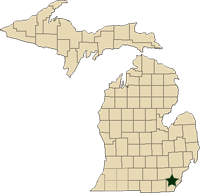Regional report on southeast Michigan field crops – August 5, 2011
Weather, pest and field crop update for southeast Michigan.
|
Weather has changed with rain, sometimes coming down in buckets, giving southeast Michigan anywhere from 2 to 8-plus inches of rain in the past week. Some flooding has occurred in commercial vegetable and field crops. The temperatures remain hot, with Detroit reporting a record hot month of July and Toledo, Ohio, reporting that July was the second hottest month on record.
Alfalfa that is down has gotten wet. The first and second cuttings were made without much problem, but the third cutting is shorter, in full bloom, and needs to be cut. Potato leafhoppers are over threshold. Hay is plentiful, which means prices have been lower.
Corn is mostly at the silking stage, though there are fields that are 5 to 10 days away from tasseling. The relentless heat during July has farmers checking fields for pollination problems. I have not seen any barren ears in fields with insect traps. Western bean cutworm numbers dropped this week and I did not find any egg masses. Western bean cutworm moth counts are not nearly has high as other areas of Michigan or the Midwest.
European corn borer numbers remain near zero and corn earworm moths caught in heliothis traps are also very low. I can find more corn rootworms in corn than soybeans, so the yellow sticky traps have not caught a single variant western corn rootworm this season in traps in three counties.
Soybeans are at the R3 developing pod stage. Vegetative growth was terrific this past week as I had to move my yellow sticky traps up about twelve inches. I have not found any soybean aphids and the rain has moderated any spider mite problems. Japanese beetles are present as is sudden death syndrome and soybean cyst nematodes. Manganese deficiency has not been a problem in the dry weather, although potassium deficiency symptoms are showing up in fields with low levels of this nutrient.
Wheat yields were generally good with excellent test weights. With a seasonal soybean harvest, I expect good interest by farmers in planting the same or maybe higher acres into soft red or soft white winter wheat this fall.
There will be a field day at an MSU Sudden Death Syndrome/ Soybean Cyst Nematode plot at the Matt and Mark Schultz farm in Dundee, Mich. All interested farmers are welcome and invited to attend. This will be on Wednesday, August 31, from 5:00 to 8:00 p.m. The plot is located on Toledo Street at the south side of Dundee. No registration is necessary. A free porkburger supper will be served. For more information or directions, contact Ned Birkey at 734-240-3172.



 Print
Print Email
Email



